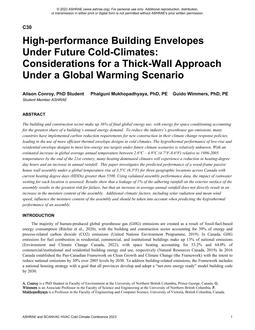Click here to purchase
The building and construction sector make up 36% of final global energy use, with energy for space conditioning accounting for the greatest share of a building’s annual energy demand. To reduce the industry’s greenhouse gas emissions, many countries have implemented carbon reduction requirements for new construction in their climate change response policies, leading to the use of more efficient thermal envelope designs in cold climates. The hygrothermal performance of low-rise and residential envelope designs to meet low-energy use targets under future climate scenarios is relatively unknown. With an estimated increase in global average annual temperature between 2.6°C – 4.8°C (4.7°F-8.6°F) relative to 1986-2005 temperatures by the end of the 21st century, many heating dominated climates will experience a reduction in heating-degree day hours and an increase in annual rainfall. This paper investigates the predicted performance of a wood-frame passive house wall assembly under a global temperature rise of 3.5°C (6.3°F) for three geographic locations across Canada with current heating degree days (HDDs) greater than 5500. Using validated assembly performance data, the impact of rainwater wetting for each location is assessed. Results show that a leakage of 1% of the adhering rainfall on the exterior surface of the assembly results in the greatest risk for failure, but that an increase in average annual rainfall does not directly result in an increase in the moisture content of the assembly. Additional climatic factors, including solar radiation and mean wind speed, influence the moisture content of the assembly and should be taken into account when predicting the hygrothermal performance of an assembly.
Product Details
- Published:
- 2023
- Number of Pages:
- 8
- Units of Measure:
- Dual
- File Size:
- 1 file , 2.1 MB
- Product Code(s):
- D-CCC23-30
- Note:
- This product is unavailable in Russia, Belarus
